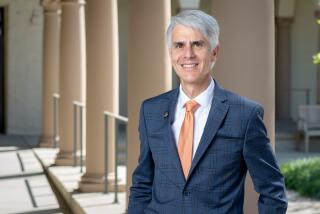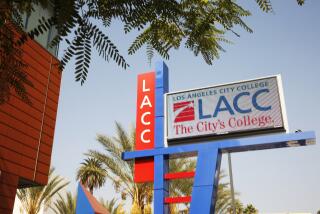Whittier College Trustee Majors in Fund Raising
- Share via
WHITTIER — Rayburn Dezember’s plans for his tenure as Whittier College’s new trustee chairman are as cool, crisp and ambitious as those of a corporate chief pursuing previously undreamed of heights of profit making.
He intends to be chairman for only two years. During that time, he wants to add $25 million to the college’s meager endowment--more than was pumped into the endowment in the entire first century of the college’s existence.
“I can either do it or get it organized in that length of time, or they need to get somebody else,” said Dezember, who speaks with the calm confidence of someone who started with nothing and now holds a number of powerful financial positions, including a place on the board of directors of the Federal Reserve Bank of San Francisco.
Aspired to Ministry
A 56-year-old Whittier graduate who once aspired to the ministry, Dezember harbors no Biblical devotion to poverty. And just as there is a season to every thing, leaders of the Quaker-founded college have decided that the season has arrived for a hard-driving businessman like Dezember to take the reins.
“We know what he has been able to accomplish in business,” said Trustee Jim Mitchell. “He is very effective as a leader, and we think the time is right for his approach. Whittier College really needs an ambitious fund-raising program at this point in its development.”
Historically, the 100-year-old private college has paid little heed to cultivating financial support, reflecting, in the words of trustee and former religion Prof. C. Milo Connick, “a reluctance on the part of our Quaker forebears to think in terms of money.”
Endowment Doubled
When President Eugene Mills took over eight years ago, the college endowment stood at a little more than $6 million. It has grown to about $15.5 million, thanks to a 6-year-old capital fund drive, the first in Whittier’s history. But that sum is still painfully low, hobbling a college that--like so many other small institutions--is struggling financially under the declining enrollments of the post baby boom years.
“We’re having many problems fiscally right now because of the drop in enrollment,” said one trustee. “We’ve been struggling, I’d say, for the past 10 years.”
Faculty salaries stagnated and building maintenance and construction fell behind--the two areas that would likely benefit the most if Dezember accomplishes what he hopes.
80% of Students Aided
With 80% of its 988 undergraduates receiving some sort of financial aid, Dezember also thinks the college should woo more students who can pay their own way. He and other trustees say Whittier can recruit the well-heeled without upsetting the ethnic mix it has cultivated in the student body, which is one-third minority or foreign.
In examining the college’s needs, the 27 trustees settled on a $25-million endowment increase as the barest, minimum requirement, says Dezember, who lives in Bakersfield.
Ranked One of Best
“In almost every respect we have moved ahead as far we can without a substantial infusion of money,” said Connick, adding that the college has made both academic and financial gains under Mills’ leadership. “What we want to do is make the next great leap forward.”
Whittier was named one of the best small, comprehensive colleges in the nation in a recent survey of college presidents conducted by U.S. News & World Report, a weekly news magazine. Now nearing an end, the fund drive that more than doubled the endowment has also netted the college $25 million in total giving since 1981--more than the college raised in its first 93 years.
College officials will not disclose the college budget. But Mills said Whittier’s debt has decreased and is “normal” for an institution of its size. The college’s financial worries are not life-threatening, say trustees.
Called the ‘Obvious Choice’
“The place is kind of in good shape,” said Dezember, assessing Whittier’s overall health.
Dezember’s election this fall to the chairmanship marked a significant departure from the norm, but, said Trusteee Charlotte Fusco, “He was the obvious choice.”
“If he can’t do it, nobody can do it, of our board,” said Fusco, referring to Dezember’s aggressive fund-raising goal.
A college trustee for 15 years, Dezember is described in glowing terms by his fellow board members. They say he is bright, persuasive, dynamic, ethical and hard working, a man who sets high goals and achieves them.
What’s more, he has money, has given a great deal to the college, knows lots of other people with money, and does not mind cultivating them.
Not Bashful About Asking
Dezember’s donations are anonymous, but he noted: “I think I’ve given enough to the point where I’m not bashful about asking people.”
As for his financial worth, he said, “We’re very comfortable financially. If I said anything more, I’d start getting letters in the mail.”
His path to riches was round about. At Whittier, he was student body president, majored in sociology and planned to become a Congregationalist minister. He was accepted into seminary, gave up his ministerial deferment to join officer training school during the Korean War, and flunked the military physical because of back problems.
Where Riches Came From
After that, he went into business with his father-in-law, starting a ready-mix concrete business in Bakersfield, and later a trucking business. In the early ‘60s, he became one of a dozen founders of American National Bank, which now has 26 offices from Modesto to San Bernardino and $700 million in assets.
He sold the trucking and concrete businesses two years ago and is now chairman of the board of American; the Central Pacific Corp., a holding company for American, and is a director of the Bakersfield Californian, a newspaper; the Federal Reserve Bank of San Francisco, and Visa U.S.A.
“I’m a believer that everyone serves in their own way in their own time in their place,” said Dezember, whose wife attended Whittier, along with two of his four children. “The one thing I bring to the party,” is financial know-how.
More to Read
Sign up for Essential California
The most important California stories and recommendations in your inbox every morning.
You may occasionally receive promotional content from the Los Angeles Times.














